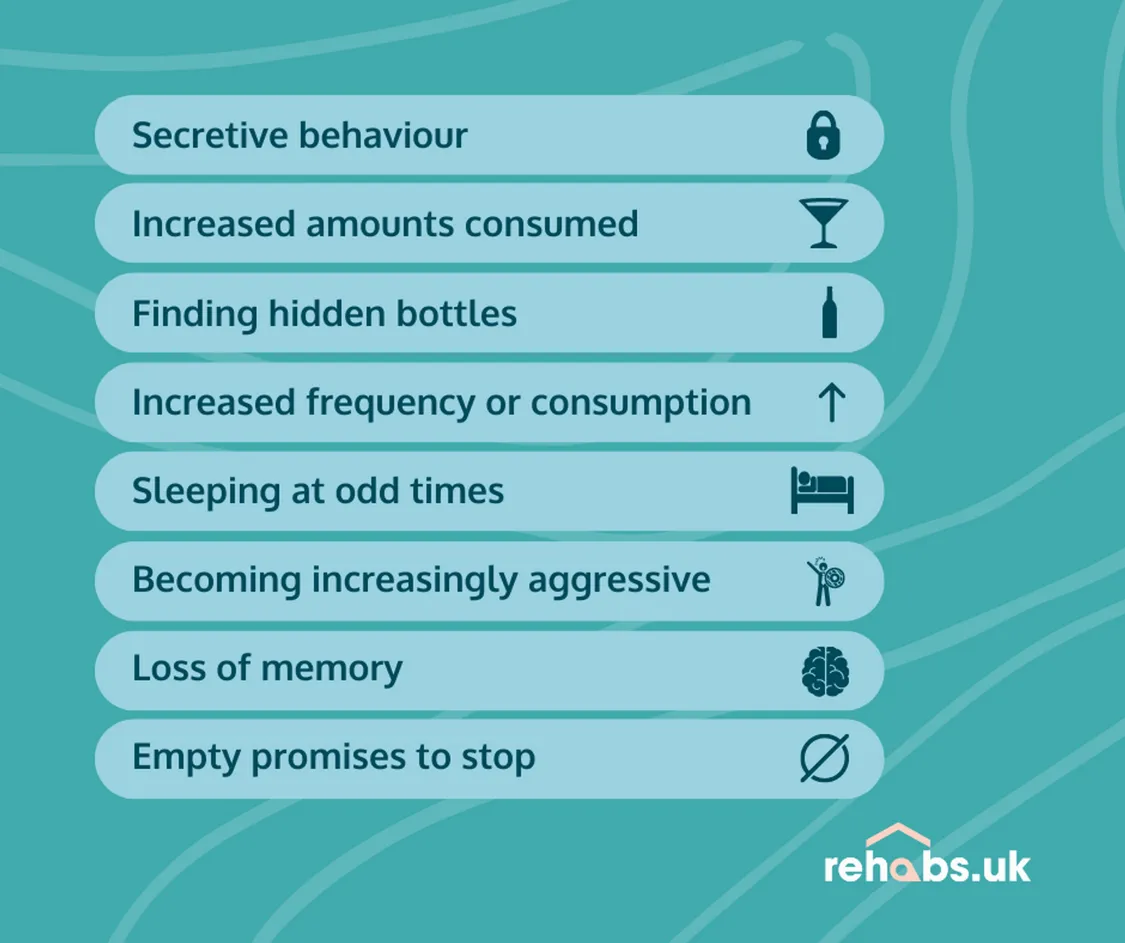28 Jul 2022
Alcoholism is also known as alcohol addiction or alcohol dependence. Someone who has alcohol dependence will often put drinking above all other obligations, such as work and family. The individual also builds up a physical tolerance, which means that they drink more and more for a similar effect, and experience withdrawal symptoms if they stop.
Physical signs
Showing signs of increased tolerance to alcohol (having to drink more for the same effect), experiencing withdrawal symptoms, or using alcohol to prevent or alleviate withdrawal symptoms.
When a person’s body becomes dependent on alcohol, you may see some of the following symptoms:
Impaired control over alcohol use
This might mean not being able to control how long a drinking session is, how much alcohol you consume when you do drink, how frequently you drink, being unable to stop drinking once you start, or drinking on inappropriate occasions or at inappropriate places.
The need for an increased amount of alcohol to achieve the same effect
There are also many dangerous withdrawal symptoms, some include:
- Hand tremors (‘the shakes’)
- Sweating
- A pulse rate above 100 beats per minute
- Nausea
- Vomiting
- Headaches
- Loss of appetite
- Depression
- Anxiety
- Irritability
- Restlessness
- Insomnia (difficulty sleeping)
According to Drink Aware, approximately one in 10 people with alcohol withdrawal syndrome are affected by seizures. If left untreated, up to one in three of these patients go on to experience delirium tremens. There are a variety of dangers of alcohol withdrawal so it's important to seek guidance when trying to remove alcohol safely.

Behavioural changes
Addiction impacts every area of a person’s life. The individual will seek out and use drugs or alcohol even as the substance use negatively impacts health, relationships, and daily functioning. The behavioural changes that result from addiction are often the first signs of a problem that loved one’s notice. The following behavioural changes may occur:
•Blackouts or memory loss
•Frequent arguments and fights
•Using alcohol to relax, improve mood, or aid in sleep
•Drinking alone, in the morning, or in secret
•Using alcohol more than intended or in spite of saying they won’t
•Neglecting friends, family, or activities that were once enjoyed, such as sports or hobbies
•Engaging in risky behaviours
•Telling lies
•Unexplained injuries or accidents
•Neglecting hygiene, grooming, and clothing
•Borrowing or stealing money with no explanation as to what the money is for
Changes in their daily lifestyle
Individuals spend more time with others who engage in alcoholism and neglect relationships with family and friends. Loved ones may notice that the individual is less social or secretive about how time is spent. New friends may appear in the individual’s life, with little explanation as to how they met.
Work or school performance typically declines when a person is suffering with alcoholism. A student who previously performed well in school may experience a drop in grades and appear less concerned with schoolwork. Job performance may suffer, and an individual may have frequent problems with co-workers or supervisors.
Alcoholism frequently occurs with other mental health disorders, particularly depression and anxiety. If your loved one suffers from a mood or anxiety disorder, they may attempt to self-medicate with alcohol. Since various mental health conditions put individuals at a higher risk for addiction, look out for your loved one and signs of substance abuse.
How to talk to your loved one about their alcoholism
The following can help you talk with your friend:
•Don't try to talk when your friend is drunk. It's also a good idea to meet in a quiet, neutral place. But not at a bar or any place else that serves alcohol.
•Talk about the effect your friend's drinking has on whatever the person cares about most, such as career or children. Your friend may not be concerned about their own situation. But they may care deeply for their children and what the problem may be doing to them.
•Be prepared for a variety of reactions, from sadness to anger. Think through how you will respond to each reaction, including exiting the situation if it gets out-of-hand.
•Be aware of treatment or recovery resources available in your community. Find the local phone number for Alcoholics Anonymous (AA). Learn what treatment resources are available in your area.
•If your friend doesn't want to go to AA, talk with other people who know and care about your friend to see if they have other ideas. Also consider getting support for yourself, such as Al-Anon. These are networks of support groups for family and friends of people with substance use disorders. At Rehabs UK we also offer a weekly online family support group which is facilitated by a therapist who specialises in addiction.
Treating alcoholism
In many cases, the first step of treating alcohol dependence is the drinker acknowledging there is a problem. As with many health problems the second step is to seek help from a healthcare professional, usually your local GP surgery or an addiction treatment provider such as Rehabs UK.
Some treatments may include:
Detoxification (also known as ‘detox’) can be a key stage of treatment. Detox involves stopping drinking completely, whilst under medical supervision, so that the body can adjust to being without alcohol. During this time, a person may experience alcohol withdrawal symptoms. A detox can take place via an alcohol home detox or within a residential facility.
Cognitive Behavioural Therapy (CBT) can be offered to help change negative thought patterns which may lead to drinking
Mutual help groups such as Alcoholics Anonymous or getting involved in group therapy help partly because of the new network of support a person gains. They can help people adjust their thinking and their attitudes to themselves and others.
If you are concerned about a loved one, do not hesitate to contact our Treatment Advisors. They are here to answer any questions you may have and discuss future options.
